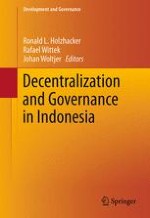2016 | OriginalPaper | Buchkapitel
6. The Inclusive Growth Concept: Strengths, Weaknesses, and a Research Agenda for Indonesia
verfasst von : Pande Nyoman Laksmi Kusumawati, J. Paul Elhorst, Jakob de Haan
Erschienen in: Decentralization and Governance in Indonesia
Aktivieren Sie unsere intelligente Suche, um passende Fachinhalte oder Patente zu finden.
Wählen Sie Textabschnitte aus um mit Künstlicher Intelligenz passenden Patente zu finden. powered by
Markieren Sie Textabschnitte, um KI-gestützt weitere passende Inhalte zu finden. powered by
